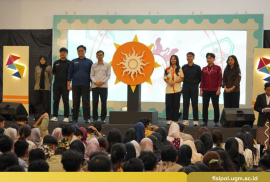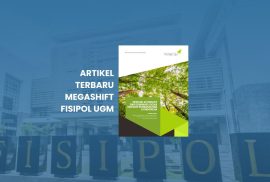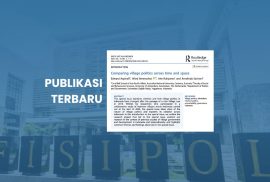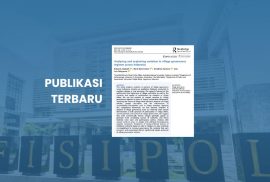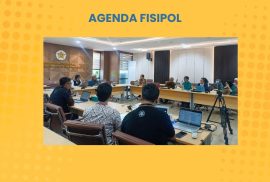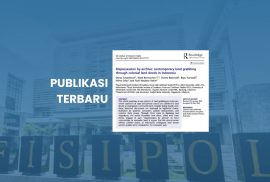Yogyakarta, August 6, 2025—The PIONIR SOCIETY 2025 series was officially held today, Wednesday (6/8), at the Faculty of Social and Political Sciences (FISIPOL) Universitas Gadjah Mada (UGM). With the theme “Derap Bara Arunika”, PIONIR SOCIETY 2025 aims to embody the spirit of students who not only strive to be self-illuminators but also to benefit the community and the surrounding environment. This theme also emphasizes the importance of adaptive, reactive, self-reliant, and inclusive values in facing the challenges of the times.
SDGs 16: Peace Justice and Strong Institutions
Yogyakarta, August 6, 2025 — The Financial Transaction Reports and Analysis Center (PPATK)’s policy of freezing “idle” bank accounts has stirred controversy among the public. Tens of millions of accounts that have shown no activity in the past three months have been categorized as dormant or inactive. The freeze, according to PPATK, aims to prevent criminal misuse of inactive accounts for illegal activities such as money laundering and account trading.
Professor Dr. Wahyudi Kumorotomo, a lecturer at the Faculty of Social and Political Sciences (FISIPOL), Universitas Gadjah Mada, described PPATK’s decision as a form of “brute-force” policy — a trial-and-error approach that fails to account for many important aspects. He noted that this is not the first time the government has issued underdeveloped policies. “Time and again, the people have witnessed that policies issued by the current administration are lacking in professionalism, and if such actions are allowed to recur, they risk further eroding the President’s legitimacy,” he stated.
Yogyakarta, 5 August 2025 — The Dean’s Office of the Faculty of Social and Political Sciences (FISIPOL) at Universitas Gadjah Mada conducted a series of special meetings with each department on 4–5 August 2025. Held in the respective department rooms, the initiative followed an evaluation carried out by the University’s Quality Assurance and Reputation Unit (SPMRU) together with the faculty’s Human Resources team, which highlighted urgent issues related to the determination of lecturer homebase and the acceleration of academic career progression.
Professor Poppy S. Winanti from the Faculty of Social and Political Sciences, Universitas Gadjah Mada (FISIPOL UGM), reaffirms her contribution to the global development discourse through her latest scholarly publication titled “International Development Cooperation and Domestic Support: Strategies of TIKA and TICA as Emerging Donors”. The article appears in Jurnal Penelitian Politik published by BRIN, Volume 21, No. 1, 2024.
In this work, Prof. Winanti critically examines the growing involvement of developing countries in the Global South as new actors in international development cooperation. The focus lies on how countries such as Thailand and Turkey — each with their dedicated agencies, the Thailand International Cooperation Agency (TICA) and the Turkish Cooperation and Coordination Agency (TIKA) — play their roles as emerging donors, providing foreign aid despite still being classified as developing nations.
Megashift FISIPOL UGM has released a new article titled “Seeking Alternatives to the Dominance of Economic Logic in Indonesia’s Development.” The piece offers a critical reflection on Indonesia’s national development agenda, which has long been centered on economic growth, investment, and macro-financial indicators.
The article emphasizes the importance of pursuing alternative development approaches that prioritize social welfare and environmental sustainability. Rather than relying solely on economic logic, it advocates for an integrative approach that incorporates social values, local wisdom, and participatory democracy into policy formulation.
The Pre-Employment Card (Kartu Prakerja) Program, initiated by President Joko Widodo as a response to the surge in unemployment during the pandemic, now faces uncertainty at the beginning of 2025. According to data from Statistics Indonesia (BPS), open unemployment remains high, reaching 7.28 million people in early 2025, with 26,455 cases of layoffs recorded.
Since its launch in 2020 until 2024, the program has supported 18.9 million beneficiaries, including 1.4 million workers in 2024 alone. The program provides digital-based training and financial incentives amounting to IDR 4,200,000 per participant, aiming to enhance skills and productivity among job seekers.
Two lecturers from the Department of Politics and Government (DPP), Faculty of Social and Political Sciences (FISIPOL) Universitas Gadjah Mada, Arie Ruhyanto and Amalinda Savirani, have once again achieved academic recognition through their latest publication in the reputable Asian Journal of Political Science, published by Routledge (Taylor & Francis). The article, titled “Comparing Village Politics Across Time and Space,” was co-authored with Edward Aspinall and Ward Berenschot.
The article offers a profound comparative study of village politics in Indonesia, examining not only geographical differences but also temporal changes. The authors explore how practices of power, patronage relations, and political participation at the village level have evolved across different periods and regions.
Two lecturers from the Department of Politics and Government (DPP), Faculty of Social and Political Sciences (FISIPOL) Universitas Gadjah Mada, Amalinda Savirani and Arie Ruhyanto, have once again contributed to international scholarship through their latest publication in the prestigious journal Asian Journal of Political Science (Routledge, Taylor & Francis). The article, titled “Analysing and Explaining Variation in Village Governance Regimes Across Indonesia,” was co-authored with Edward Aspinall and Ward Berenschot.
The Master’s Program in International Relations, Faculty of Social and Political Sciences (FISIPOL), Universitas Gadjah Mada, underwent an on-site accreditation assessment conducted by the Independent Accreditation Board for Social, Political, Administrative, and Communication Sciences (LAMSPAK) on Friday, July 25. The event took place at the Faculty Senate Meeting Room of FISIPOL UGM as part of the higher education quality evaluation process.
The assessment team from LAMSPAK consisted of two distinguished experts, Dr. Suyani Indriastuti and Dr. Dudy Heriyadi, who carried out a comprehensive evaluation of various aspects of the Master’s Program in International Relations. Their assessment covered curriculum design, teaching and learning processes, program governance, as well as the program’s outputs and broader impacts on both society and the academic community.
Bayu Dardias Kurniadi, lecturer at the Department of Politics and Government (DPP), Faculty of Social and Political Sciences (FISIPOL) Universitas Gadjah Mada, has achieved another academic milestone through his latest publication in the internationally renowned journal Journal of Peasant Studies (Routledge). The article, titled “Dispossession by Archive: Contemporary Land Grabbing Through Colonial Land Deeds in Indonesia,” was co-authored with Diana Suhardiman, Ward Berenschot, Dianto Bachriadi, Hilma Safitri, and Rizki Maulana Hakim.

